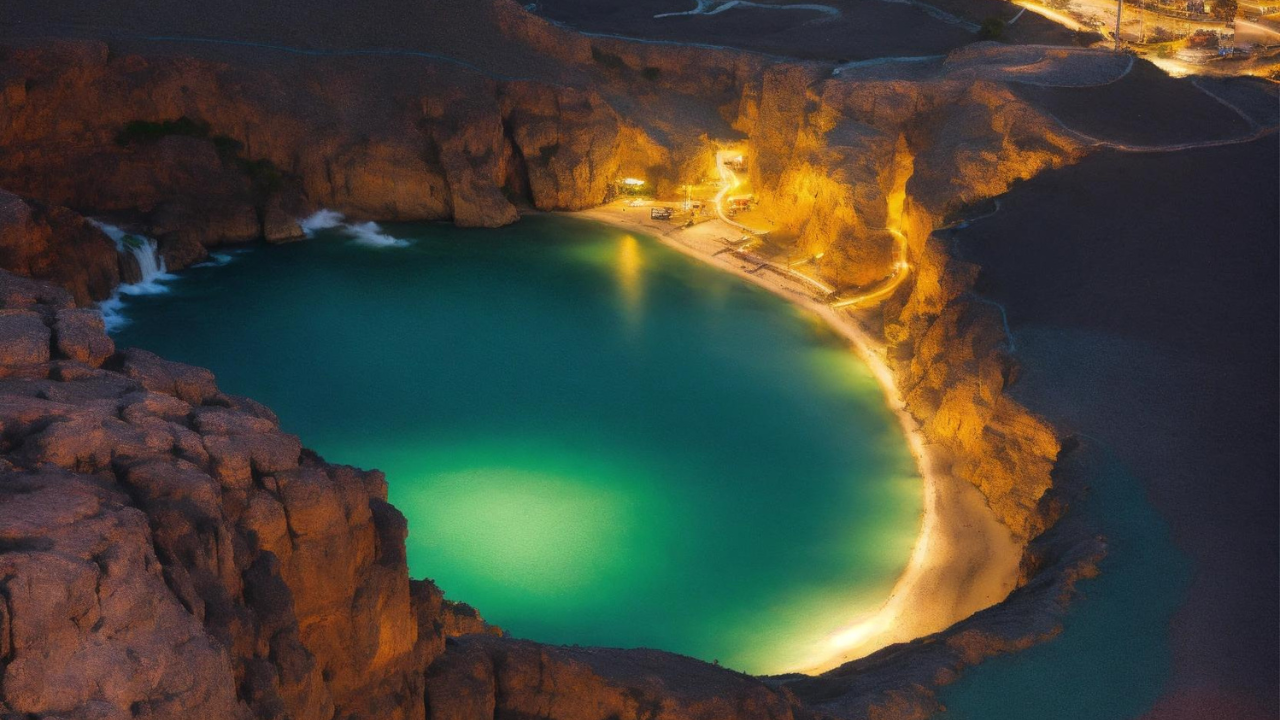
Guillermo Söhnlein, the co-founder and former CEO of OceanGate, plans to lead an expedition to Dean’s Blue Hole in the Bahamas often called the ‘portal to hell‘, a sinkhole known for its extreme depth.
Söhnlein, who left OceanGate to start Blue Marble Exploration, will be joined by scientist Kenny Broad and former Nasa astronaut Scott Parazynski to explore the virtually unexplored underwater cavern, according to the New York Post.
According to Blue Marble, Dean’s Blue Hole has a unique “vase” shape with a narrow opening at the surface, leading to a much wider chamber below. This shape, combined with its extreme depth, poses significant challenges, including potential “unforeseen currents and thermal layers that could interfere with underwater operations.” These conditions contribute to the element of unpredictability the expedition team will face.
Dean’s Blue Hole, the site of the new expedition, is one of the world’s deepest ocean sinkholes at 664 feet and formed roughly 15,000 years ago. Despite its allure, due to its depth, very little is known about it. “To date, Dean’s Blue Hole has been virtually unexplored,” the company stated on its website. “Venturing into uncharted waters, our team will have to ‘expect the unexpected.’”
One of the major concerns for the expedition is handling the intense pressure at the floor of the sinkhole, measured at almost 300 pounds per square inch, or about 20 times the pressure found at the surface. Moreover, the majority of the hole remains in complete darkness due to its narrow opening.
Furthermore, locals have long regarded Dean’s Blue Hole as a hazardous location. Several people drown there each year. Blue Marble Exploration has acknowledged this risk and said, “We fully expect to find human remains and prepare to handle those situations with proper respect for the families.”
While the exact departure date for Söhnlein and his team has not been disclosed, the endeavor aims to be less risky than OceanGate’s ill-fated dive to the Titanic last year. The depth of Dean’s Blue Hole at 664 feet is far shallower compared to the Titanic wreckage, which is located more than 12,500 feet below the surface of the North Atlantic.
Söhnlein founded OceanGate in 2009 with Stockton Rush, who was among the five victims of the imploded submersible during a dive to the Titanic wreck last June.
The earlier OceanGate disaster unfolded on June 18, 2023, when the Titan submersible embarked on a dive to the Titanic with five people on board: Rush, French Titanic expert Paul-Henri Nargeolet, tourists Hamish Harding, businessman Shahzada Dawood and his son, Suleman Dawood. Passengers reportedly paid up to $250,000 each for the journey.
However, the mission took a turn when communication with the submersible was lost approximately one hour and 45 minutes into the dive, shortly before it reached the Titanic’s wreck. After nearly five days of extensive search operations, the US Coast Guard discovered debris “consistent with a catastrophic implosion of the vessel” on the ocean floor near the 1912 shipwreck. Tragically, all five passengers were killed instantly due to the immense underwater pressure.
Söhnlein, who left OceanGate to start Blue Marble Exploration, will be joined by scientist Kenny Broad and former Nasa astronaut Scott Parazynski to explore the virtually unexplored underwater cavern, according to the New York Post.
According to Blue Marble, Dean’s Blue Hole has a unique “vase” shape with a narrow opening at the surface, leading to a much wider chamber below. This shape, combined with its extreme depth, poses significant challenges, including potential “unforeseen currents and thermal layers that could interfere with underwater operations.” These conditions contribute to the element of unpredictability the expedition team will face.
Dean’s Blue Hole, the site of the new expedition, is one of the world’s deepest ocean sinkholes at 664 feet and formed roughly 15,000 years ago. Despite its allure, due to its depth, very little is known about it. “To date, Dean’s Blue Hole has been virtually unexplored,” the company stated on its website. “Venturing into uncharted waters, our team will have to ‘expect the unexpected.’”
One of the major concerns for the expedition is handling the intense pressure at the floor of the sinkhole, measured at almost 300 pounds per square inch, or about 20 times the pressure found at the surface. Moreover, the majority of the hole remains in complete darkness due to its narrow opening.
Furthermore, locals have long regarded Dean’s Blue Hole as a hazardous location. Several people drown there each year. Blue Marble Exploration has acknowledged this risk and said, “We fully expect to find human remains and prepare to handle those situations with proper respect for the families.”
While the exact departure date for Söhnlein and his team has not been disclosed, the endeavor aims to be less risky than OceanGate’s ill-fated dive to the Titanic last year. The depth of Dean’s Blue Hole at 664 feet is far shallower compared to the Titanic wreckage, which is located more than 12,500 feet below the surface of the North Atlantic.
Söhnlein founded OceanGate in 2009 with Stockton Rush, who was among the five victims of the imploded submersible during a dive to the Titanic wreck last June.
The earlier OceanGate disaster unfolded on June 18, 2023, when the Titan submersible embarked on a dive to the Titanic with five people on board: Rush, French Titanic expert Paul-Henri Nargeolet, tourists Hamish Harding, businessman Shahzada Dawood and his son, Suleman Dawood. Passengers reportedly paid up to $250,000 each for the journey.
However, the mission took a turn when communication with the submersible was lost approximately one hour and 45 minutes into the dive, shortly before it reached the Titanic’s wreck. After nearly five days of extensive search operations, the US Coast Guard discovered debris “consistent with a catastrophic implosion of the vessel” on the ocean floor near the 1912 shipwreck. Tragically, all five passengers were killed instantly due to the immense underwater pressure.
























